O. Reg. 86/91: GENERAL LEGISLATIVE GRANTS, 1991, Education Act, R.S.O. 1990, c. E.2
Education Act
Loi sur l’éducation
ONTARIO REGULATION 86/91
Amended to O. Reg. 155/01
GENERAL LEGISLATIVE GRANTS, 1991
Note: This Regulation was revoked on May 11, 2001. See: O. Reg. 155/01, s. 1.
This Regulation is made in English only.
Definitions
1. In this Regulation, the following definitions apply for a board for the year 1991,
“assessment” means the sum of,
(a) the residential and farm assessment as defined in section 248 of the Act, and
(b) the quotient obtained by dividing by 0.85 the commercial assessment as defined in section 248 of the Act,
that is rateable for the purposes of the boards;
“A.E.F. for grant purposes”, for a municipality or locality, means the assessment equalization factor provided by the Minister for this purpose;
“A.D.E.” means average daily enrolment calculated correct to two places of decimals under Ontario Regulation 89/91 (Calculation of Average Daily Enrolment);
“capital appurtenances” means,
(a) school sites and additions and improvements thereto,
(b) school buildings, including permanent fixtures thereof, and additions, alterations and renovations to such buildings and permanent fixtures,
(c) buildings that are not school buildings, including permanent fixtures thereof, and additions, alterations and renovations to such buildings and permanent fixtures,
(d) vehicles and watercraft used for the transportation of pupils, and replacements of such vehicles and watercraft, and
(e) furniture and equipment and replacements thereof and library resource materials for the initial equipping of a library resource centre, but excluding therefrom items referred to in clause (d) and permanent fixtures of a building;
“capital element included in rent”, in respect of rental of computer equipment for instructional purposes and rental of accommodation and school sites, means the total rental revenue or rental expenditure, as the case may be, that is in excess of the cost of services that are included as part of the rental contract, except that in the case of rental of computer equipment or accommodation for instructional purposes, the capital element in rent cannot be less than the portion designated by the Minister for inclusion in the determination of the recognized extraordinary expenditure of the board;
“continuing education A.D.E. for grant purposes” means the sum of the portion of the A.D.E. calculated under section 3 of Ontario Regulation 89/91 (Calculation of Average Daily Enrolment) that is in respect of pupils enrolled in a program operated by the board in a course approved by the Minister,
(a) established for adults for which credit is granted or in an independent study course and, in the case of a separate school board other than a Roman Catholic school board, the course is in the intermediate division,
(b) of basic literacy or basic numeracy for adults,
(c) of citizenship and language instruction for persons admitted to Canada as permanent residents under the Immigration Act (Canada), or
(d) of English or French as a second language for adults whose first language is neither English nor French,
and in the case of,
(e) a course described in clause (a), except for a pupil enrolled in an independent study course, for French-speaking adults in which French is the language of instruction,
(f) a course described in clause (b), where the instructors are employed by and paid by the board, or the course is provided under subsection 189 (2) of the Act,
(g) a course described in clause (c) or (d), or
(h) a course described in clause (a), except for a pupil enrolled in an independent study course, offered in a secondary school that has an enrolment of fewer than 120 pupils per grade and that is located in a territorial district more than 80 kilometres from all other secondary schools in the Province that have the same language of instruction,
where the number of pupils is fewer than fifteen, such number shall be increased by five or a lesser number, as the case requires, to a maximum of fifteen for the purpose of calculating the continuing education A.D.E. for grant purposes;
“current cost of operating” means total of all the current expenditure less the sum of,
(a) current expenditure for,
(i) the capital element included in rent payable,
(ii) transportation of pupils and persons qualified to be resident pupils to and from a school, a facility referred to in subsection 190 (3) of the Act or a centre referred to in subsection 190 (4) thereof,
(iii) transportation of pupils from one school to another school or a facility referred to in subsection 190 (3) of the Act, where such transportation is of a kind that is eligible for approval by the Minister as R.E.E.,
(iv) board, lodging and weekly transportation of pupils under sections 76, 190, 289 and 291 of the Act,
(v) capital appurtenances referred to in clauses (a), (b), (c) and (d) of the definition “capital appurtenances”,
(vi) capital appurtenances referred to in clause (e) of the definition “capital appurtenances” that have not been designated by the board as ordinary expenditure,
(vii) debt charges,
(viii) tuition fees in respect of resident-external pupils of the board,
(ix) P.A.C. in respect of resident-external pupils of the board,
(x) relocation of portable classrooms,
(xi) restoration of destroyed and damaged capital appurtenances, and
(xii) interest on short-term borrowings for the period between the date of issue and date of sale of debentures for the purchase of capital appurtenances,
(b) the sum of,
(i) tax adjustments,
(ii) the costs of performing the duties of a municipal council in territory without municipal organization,
(iii) provision for a reserve for working funds,
(iv) provision for a reserve for tax reduction in 1992,
(v) allocation to reserve funds,
(vi) payments made under Ontario Regulation 90/91 (Payment Transfer Between Coterminous Boards),
(c) current revenue from sources other than,
(i) legislative grants except payments under subsections 16 (2) and 17 (2), section 26, subsections 27 (1) and (4) and sections 29, 40 and 41,
(ii) taxes, payments in lieu of taxes and trailer fees,
(iii) tuition fees in respect of non-resident pupils of the board,
(iv) the P.A.C. in respect of non-resident pupils of the board,
(v) the capital element included in rent receivable,
(vi) disposal of capital appurtenances,
(vii) insurance proceeds in respect of capital appurtenances,
(viii) transfers from other funds,
(ix) transfers from a reserve for working funds,
(x) transfer from a reserve for tax reduction,
(xi) accrued interest on debentures sold at date of sale thereof,
(xii) interest earned on capital funds,
(xiii) reimbursements of expenditure for transportation of pupils including payments under sections 34 and 35,
(xiv) grants, except legislative grants, or other reimbursements for capital expenditure from the revenue fund,
(xv) donations directed in writing by the donor to the purchase of a capital appurtenance and so applied,
(xvi) payments received under Ontario Regulation 90/91 (Payment Transfer Between Coterminous Boards), and
(xvii) payments made under subsection 44 (3) of the Ottawa-Carleton French-Language School Board Act, and
(d) the amount calculated under clause 28 (a);
“day school A.D.E. of non-resident pupils” means the portion of the A.D.E. calculated under section 2 of Ontario Regulation 89/91, (Calculation of Average Daily Enrolment) that is in respect of non-resident pupils of the board;
“day school A.D.E. of resident-internal pupils” means the portion of the A.D.E. calculated under section 2 of Ontario Regulation 89/91, (Calculation of Average Daily Enrolment) that is in respect of resident-internal pupils of the board;
“day school A.D.E. of resident-external pupils” means the portion of the A.D.E. calculated under section 2 of Ontario Regulation 89/91, (Calculation of Average Daily Enrolment) that is in respect of resident-external pupils of the board;
“elementary school pupil” means a pupil who is enrolled in a school operated by,
(a) a district school area board, a Protestant separate school board, a Roman Catholic separate school board other than a Roman Catholic school board, or
(b) a board of education, a Roman Catholic school board or the public sector or the Roman Catholic sector of The Ottawa-Carleton French-language School Board for the purposes of receiving education in the primary division, junior division or first two years of the intermediate division;
“eligible sum for French as a first language” means,
(a) in respect of elementary school pupils, the sum of,
(i) the product of $291 and the enrolment for a program provided in a French-language instructional unit, and
(ii) where in 1991 the board establishes under section 289 of the Act a class in which French is the language of instruction in an elementary school where no such class was provided prior to the 2nd day of September, 1974 and such class is approved by the Minister for grant purposes,
(A) $5,400 if the class established in 1991 is the first,
(B) $3,240 if the class established in 1991 is the second,
(C) $2,160 if the class established in 1991 is the third,
such class in the school, and
(b) in respect of secondary school pupils, the sum of the products obtained by multiplying the enrolment for a program in a subject in a class established under section 291 of the Act in which French is the language of instruction, by the number of credits that may be granted to a pupil for the subject or by one in the case of a subject offered in a day school in a course for which no credit may be granted and for which a minimum of 110 hours has been scheduled and by,
(i) $89 in the case of pupils enrolled in the intermediate division,
(ii) $95 in the case of pupils enrolled in the senior division,
subject to the limitation that the maximum number of credits or courses for which no credit may be granted that may be taken into account for the purpose of this subparagraph in respect of any one pupil is five;
“eligible sum for French as a second language” means,
(a) in respect of elementary school pupils, the sum of,
(i) the product of $119 and the enrolment for a program in classes established for pupils whose first language is not French of an average of 20 or more minutes but less than 40 minutes per school day of instruction in French,
(ii) the product of $229 and the enrolment for a program in classes established for pupils whose first language is not French of an average of 40 or more minutes but less than 60 minutes per school day of instruction in French,
(iii) the product of $260 and the enrolment for a program in classes established for pupils whose first language is not French of an average of 60 or more minutes but less than 150 minutes per school day of instruction in French, and
(iv) the product of $291 and the enrolment for a program in classes established for pupils whose first language is not French of an average of,
(A) 150 minutes or more per school day of instruction in French, for pupils other than pupils enrolled in junior kindergarten or kindergarten, or
(B) 75 minutes or more per school day of instruction in French, for pupils enrolled in junior kindergarten or kindergarten, and
(b) in respect of secondary school pupils, the sum of,
(i) the products obtained by multiplying the enrolment for a program in the subject of French that is established for pupils whose first language is not French, by the number of credits that may be granted to a pupil for such subject, and by,
(A) $57 in the case of a subject offered in the intermediate division, or
(B) $75 in the case of a subject offered in the senior division, and
(ii) the products obtained by multiplying the enrolment for a program established for pupils whose first language is not French and in which a subject other than French is taught in the French language, by the number of credits that may be granted to a pupil for such subject, and by,
(A) $94 in the case of a subject offered in the intermediate division, or
(B) $145 in the case of a subject offered in the senior division;
“eligible sum for full-day kindergarten” means the product of,
(a) the sum of $3,801 and the amounts per pupil that are set out in Columns 10 and 11 of Table 2 opposite the name of the board in Column 1 of Table 2,
(b) 0.50, and
(c) the sum of the products of the number of resident-internal and non-resident pupils of the board,
(i) who on the last school day of September, 1990 are enrolled for an average of 300 or more minutes per school day in a kindergarten operated by the board and 0.6, and
(ii) who on the last school day of September, 1991 are enrolled for an average of 300 or more minutes per school day in a kindergarten operated by the board and 0.4;
“eligible sum for Native as a second language” means,
(a) in respect of elementary school pupils, the sum of,
(i) the product of $219 and the enrolment in a Native language program of an average of 20 or more minutes but less than 40 minutes per school day,
(ii) the product of $389 and the enrolment in a Native language program of an average of 40 or more minutes per school day, and
(b) in respect of secondary school pupils, the sum of the products obtained by multiplying the enrolment in a Native language program by the number of credits that may be granted to a pupil for such program, and by,
(i) $57 in the case of a program offered in the intermediate division, or
(ii) $75 in the case of a program offered in the senior division;
“enrolment for a program” means the sum of,
(a) the product of the number of resident-internal pupils and non-resident pupils of the board who on the last school day of September, 1990 are registered in the program and 0.6, and
(b) the product of the number of resident-internal pupils and non-resident pupils of the board who on the last school day of September, 1991 are registered in the program and 0.4;
“enrolment in a Native language program” means the sum of the products of the number of resident-internal pupils and non-resident pupils of the board, other than those whose fees are receivable from Canada or from a band, council of a band or education authority authorized by the Crown in right of Canada to provide education for Indians,
(a) who on the last school day of September, 1990 are registered in the program and 0.6, and
(b) who on the last school day of September, 1991 are registered in the program and 0.4;
“E.A.” means equalized assessment for a board and is equal to the sum of the equalized assessment for the municipalities or localities within the jurisdiction of the board, reduced in the case of a Roman Catholic school board, or increased in the case of a public board, by the equivalent assessment in respect of payment transfer;
“equalized assessment for a municipality or locality” means the quotient obtained by dividing the product of 100 and the sum of the assessment and the equivalent assessment for the municipality or locality by the A.E.F. for grant purposes;
“equivalent assessment for a municipality or locality” means the amount of assessment that would yield an amount equal to the sums payable or allocated by the municipality or locality to a board in respect of,
(a) the tax levied under subsections 159 (12) and (13) of the Municipal Act that is paid or allocated to the board, and
(b) payments in lieu of taxes,
if such assessment were levied upon at the rate levied in 1990 in the municipality or locality for the purposes of the board on residential and farm assessment, or such amount as adjusted by the Minister;
“equivalent assessment in respect of payment transfer” means,
(a) for a public board, the sum of the amounts that are determined, in respect of each of the Roman Catholic school boards from which the board receives a payment under section 2 of Ontario Regulation 90/91 (Payment Transfer Between Coterminous Boards), by taking the product of the amount described as E/F in subsection 2 (1) of such regulation, and the sum of the equalized assessment for separate school purposes for the municipalities or localities within the jurisdiction of both the public board and the Roman Catholic school board,
(b) for a Roman Catholic school board, the sum of the amounts that are determined, in respect of each of the public boards to which the board makes a payment under section 2 of Ontario Regulation 90/91 (Payment Transfer Between Coterminous Boards), by taking the product of the amount described as E/F in subsection 2 (1) of such regulation, and the sum of the equalized assessment for separate school purposes for the municipalities or localities within the jurisdiction of both the public board and the Roman Catholic school board;
“isolate board” means a district school area board, a rural separate school board, a combined Roman Catholic separate school board, a Protestant separate school board or a secondary school board;
“maximum recognized day school O.E.” means the amount calculated as follows,s
![]()
![]()
where,
A |
= |
the product of the day school A.D.E. of resident-internal pupils of the board and $3,770 in the case of elementary school pupils and $4,710 in the case of secondary school pupils, |
B |
= |
the excess of, |
(a) the total of the salaries, wages and related employee benefits that are not payable to teachers and other employees of the board because of a strike or lockout, other than salaries, wages and employee benefits for instruction of summer schools, heritage language classes, driver education classes and courses referred to in the definition “continuing education A.D.E. for grant purposes”,
over,
(b) the expenditures incurred by the board that, in the opinion of the Minister, are attributable to a strike or lockout of the employees for which the savings for salaries, wages and employee benefits are included in clause (a) except a provision for a reserve for tax reduction, and
C |
= |
O.E. less tuition fees in respect of resident-external pupils of the board; |
“MR” means the standard mill rate for R.O.E. and is equal to 0.005628 for elementary school purposes or 0.004635 for secondary school purposes;
“MR1” means the standard mill rate for first level of R.E.E. and is equal to 0.000090 for elementary school purposes or 0.000048 for secondary school purposes;
“MR2” means the standard mill rate for second level of R.E.E. and is equal to 0.000022 for elementary school purposes or 0.000010 for secondary school purposes;
“MR3” means the standard mill rate for operating expenditure and is equal to 0.000149 for elementary school purposes or 0.000098 for secondary school purposes;
“non-resident pupil”, of a board, means a pupil, other than a pupil from outside Ontario enrolled at a school under a student exchange program approved by the board, who is enrolled at a school operated by the board,
(a) in respect of whom,
(i) the Minister pays the cost of education,
(ii) the board charges a fee to another board,
(iii) the board may charge a fee to Canada, to a board appointed under section 68 of the Act or to a source outside Ontario, or
(iv) the board may charge a fee to a band, the council of a band or education authority that is authorized by the Crown in right of Canada to provide education for Indians,
(b) who is a registered Indian residing on a reserve as defined in the Indian Act (Canada), or
(c) who is a pupil in Canada as a visitor or as a student under the Immigration Act (Canada) for whom the board is required under subsection 49 (6) of the Act to charge the maximum fee calculated in accordance with the regulations;
“O.E.” means ordinary expenditure and is equal to the current cost of operating increased by tuition fees in respect of resident-external pupils of the board, and reduced by the sum of,
(a) the eligible sum for French as a first language, the eligible sum for French as a second language, the eligible sum for full-day kindergarten, the eligible sum for Native as a second language and the recognized expenditure for textbooks,
(b) cost of education payable under sections 31 to 33 inclusive reduced by the P.A.C. included in such cost of education,
(c) tuition fees in respect of non-resident pupils of the board,
(d) grants for reduction in class size for grades 1 and 2 determined under section 21,
(e) grants for small schools, small boards, small sections, goods and services, compensatory education, declining enrolment, language instruction, mixed schools and technical education determined under sections 10, 11, 12, 13, 14, 15, 18, 19 and 25 respectively,
(f) assistance for open-access tuition fees determined under section 39,
(g) grants providing special compensation for pooling under section 45, and
(h) payments made under subsection 44 (3) of the Ottawa-Carleton French-Language School Board Act;
“P.A.C.” means the pupil accommodation charge for a pupil and is equal to the product of the portion of the A.D.E. calculated under section 2 of Ontario Regulation 89/91 (Calculation of Average Daily Enrolment) that is in respect of the pupil and $141 in the case of an elementary school pupil or $282 in the case of a secondary school pupil;
“payment in lieu of taxes” means, in respect of a municipality, the sum of,
(a) the amounts payable by the municipality to the board under subsection 7 (10) of the Housing Development Act, under subsection 445 (4) of the Municipal Act and under subsection 52 (9) of the Power Corporation Act,
(b) the amount paid by the municipality to the board that is in excess of the amount requisitioned by the board and which is in respect of an allocation of taxes or payments in lieu of taxes other than the amount receivable by the board under section 35 of the Assessment Act,
(c) the amounts receivable by the board from subscriptions in lieu of taxes, and
(d) the amounts payable by the municipality to the board under section 2 of the Municipal and School Board Payments Adjustment Act;
“psychiatric facility” means a children’s mental health centre established or approved under subsection 8 (1) of Part I (Flexible Services) of the Child and Family Services Act, or a facility designated as a psychiatric facility under the Mental Health Act and includes the private hospital known as “The Villa” and located in the City of Vaughan;
“R.E.E.” means recognized extraordinary expenditure and is equal to the sum of,
(a) the amount approved by the Minister for grant purposes for the period from January 1, 1991 to June 30, 1991 for the transportation of,
(i) resident-internal pupils and resident-external pupils of the board to and from school and from school to school, and
(ii) persons qualified to be resident pupils of the board to and from the schools and facilities referred to in subsection 190 (3) of the Act and the centres referred to in subsection 190 (4) thereof,
except where the parent or guardian of a pupil contributes, other than by taxation, to the cost of such transportation,
(b) the amount approved by the Minister for grant purposes for the period from January 1, 1991 to June 30, 1991, for board, lodging and weekly transportation to school and return of resident-internal pupils and resident-external pupils of the board,
(c) debt charges payable by the board or on its behalf by a municipality or a county in respect of the portion of a debenture approved by the Minister for grant purposes,
(d) the portion of the items referred to in clauses (a), (b) and (c) of the definition “capital appurtenances” that is approved by the Minister for grant purposes, other than capital projects eligible for grant under section 51 and the restoration of such items up to the amount of the proceeds of insurance in respect of their loss,
(e) the portion of the items referred to in clause (d) of the definition “capital appurtenances” that is approved by the Minister for grant purposes,
(f) the portion of the items referred to in clause (e) of the definition “capital appurtenances” that has not been designated by the board as O.E., is not eligible for grant under subsection 27(3) or section 51, and is approved by the Minister for grant purposes,
(g) the restoration of the items referred to in clauses (d) and (e) of the definition “capital appurtenances” up to the amount of the proceeds of insurance in respect of their loss,
(h) the lesser of,
(i) expenditure for items referred to in clause (e) of the definition “capital appurtenances” less the sum of,
(A) such expenditure included in clause (f) or (g),
(B) such expenditure eligible for grant under subsection 27 (3) or section 51,
(C) such expenditure designated by the board as O.E., and
(D) current revenue from donations that is not deducted in the determination of current cost of operating under subclause (c) (xv) of the definition “current cost of operating” except such revenue from donations that is applied to expenditure for capital appurtenances that is other than expenditure for furniture and equipment included in this subclause, and
(ii) the sum of,
(A) current revenue from the sale or disposal of items referred to in clause (e) of the definition “capital appurtenances”, and
(B) the product of $16 in the case of an elementary school pupil or $27 in the case of a secondary school pupil and the day school A.D.E. of resident-internal pupils of the board,
less the portion of the revenue from the sale or disposal of, and from insurance proceeds in respect of, capital appurtenances that is designated by the Minister as deductible from R.E.E.,
(i) the portion approved by the Minister for grant purposes of the capital element included in rent payable,
(j) the P.A.C. in respect of resident-external pupils of the board,
(k) the portion of the expenditure for the relocation of portable classrooms that is not in excess of the product of $4,250 and the number of relocations approved by the Minister,
(l) the portion of the expenditure approved by the Minister for the training of teachers in the use of computer technology for instructional purposes, and
(m) the portion of the expenditure approved by the Minister for the training of teachers in the use of technological equipment for instructional purposes,
less the sum of,
(n) the P.A.C. in respect of non-resident pupils of the board, and
(o) the portion of the capital element included in rent receivable that is designated by the Minister as deductible from R.E.E.;
“R.O.E.” means recognized ordinary expenditure and is equal to the lesser of the O.E. and the sum of,
(a) the maximum recognized day school O.E.,
(b) the teacher qualifications and experience adjustment,
(c) the product of the portion of the summer school A.D.E. for grant purposes that is in respect of elementary school pupils of the board and $3,770,
(d) the recognized tuition fees, and
(e) the sum of,
(i) the portion of the expenditure that is approved by the Minister for training assistance of designated persons as specified in Regulation 312 of the Revised Regulations of Ontario, 1990 (Training Assistance), and
(ii) the portion of the salaries, wages and benefits paid by the board to designated persons referred to in subclause (i) that is approved by the Minister and that is in respect of the portion of the designated person’s contract time during 1991 that is specified, in a written agreement between the designated person and the board, as being directed towards training and released from board-assigned duties;
“recognized expenditure for textbooks” means the sum of,
(a) the lesser of,
(i) the expenditure of the board for textbooks for Ontario Academic Courses or courses leading to the Secondary School Honour Graduation Diploma that are listed in Circular 14 or are approved by the board under schedule 5 of Circular 14, and
(ii) the product of $5 and the day school A.D.E. of resident-internal pupils of the board, and
(b) the lesser of,
(i) the expenditure of the board for textbooks listed in Circular 14 or approved by the board under clause 3 (b) of Circular 14, other than textbooks for Ontario Academic Courses or courses leading to the Secondary School Honour Graduation Diploma, that is in excess of the product of the day school A.D.E. of resident-internal pupils of the board and $13 in the case of elementary school pupils or $22 in the case of secondary school pupils, and
(ii) the product of the day school A.D.E. of resident-internal pupils of the board and $15 in the case of elementary school pupils or $12 in the case of secondary school pupils;
“recognized expenditure for transportation” means the sum of,
(a) the amount approved by the Minister for grant purposes for the period from July 1, 1991 to December 31, 1991 for the transportation of,
(i) resident-internal pupils and resident-external pupils of the board to and from school and from school to school, and
(ii) persons qualified to be resident pupils of the board to and from the schools and facilities referred to in subsection 190 (3) of the Act and the centres referred to in subsection 190 (4) thereof,
except where the parent or guardian of a pupil contributes, other than by taxation, to the cost of such transportation, and
(b) the amount approved by the Minister for grant purposes for the period from July 1, 1991 to December 31, 1991 for board, lodging and weekly transportation to school and return of resident-internal pupils and resident-external pupils of the board;
“recognized tuition fees” means the expenditure for tuition fees less the sum of,
(a) the product of $3,770 in the case of an elementary school pupil or $4,710 in the case of a secondary school pupil and the number by which the A.D.E. in respect of resident-external pupils of the board is increased for fee purposes by the application of factors determined under subsection 3 (4) of Ontario Regulation 88/91 (Calculation of Fees for Pupils), and
(b) the sum of the amounts that are determined for the board, in respect of each of the boards with which the board has the same or part of the same area of jurisdiction, calculated as follows,
A × (B × C)
where,
A |
= |
the portion of the A.D.E. calculated under section 2 of Ontario Regulation 89/91 (Calculation of Average Daily Enrolment) that is in respect of secondary school pupils who are resident-external pupils of the board and for whom fees are payable to the board that has the same or part of the same area of jurisdiction, |
B |
= |
the tuition fee charged by the board that has the same or part of the same area of jurisdiction as determined under clause 3 (1) (a) of Ontario Regulation 88/91 (Calculation of Fees for Pupils), and |
C |
= |
the sum of $4,727 and the amounts per pupil that are set out in Columns 10 and 11 of Table 2 opposite the name of the board in Column 1 of Table 2, |
and where the amount is negative, it shall be zero;
“resident-external pupil”, of a board, means a pupil whose fee is payable by the board;
“resident-internal pupil”, of a board, means a pupil, other than a non- resident pupil, who is enrolled at a school operated by the board;
“secondary school pupil” means a pupil who is enrolled in a school operated by,
(a) a secondary school board, or
(b) a board of education, a Roman Catholic school board or the public sector of the Roman Catholic sector of The Ottawa-Carleton French-language School Board for the purposes of receiving education in the last two years of the intermediate division or in the senior division;
“summer school A.D.E. for grant purposes” means,
(a) in respect of elementary school pupils, the portion of the A.D.E. calculated under section 3 of Ontario Regulation 89/91 (Calculation of Average Daily Enrolment) that is in respect of resident-internal pupils of the board enrolled in summer schools established by the board, in a course of study that the board is authorized or required to provide in its day school program in grades 1 to 8, and the course is approved by the Minister for grant purposes, and
(b) in respect of secondary school pupils, the portion of the A.D.E. calculated under section 3 of Ontario Regulation 89/91 (Calculation of Average Daily Enrolment) that is in respect of pupils enrolled in summer schools established by the board in a course for which credit is granted, and the course is approved by the Minister for grant purposes;
“Table 1”, “Table 2”, “Table 3” and “Table 4” mean Tables 1, 2, 3 and 4, respectively, as set out in the original version of Ontario Regulation 86/91 as published in The Ontario Gazette dated March 23, 1991;
“teacher qualifications and experience adjustment” means the product of,
(a) the day school A.D.E. of resident-internal pupils of the board,
(b) the amount per pupil that is set out in Column 11 of Table 2 opposite the name of the board in Column 1 of Table 2, and
(c) where a strike or lockout of certain employees of the board occurs during the year, the ratio of the O.E. to the sum of the O.E. and the excess described as B in the definition “maximum recognized day school O.E.”;
“tuition fees” means fees for instruction of pupils, less any P.A.C. that is included therein in respect of such pupils. O. Reg. 86/91, s. 1.
Conditions
2. (1) The legislative grant payable for 1991 to a board other than an isolate board or a board appointed under section 68 of the Act shall be the sum of the amounts calculated under sections 8 to 45 and section 51.
(2) The legislative grant payable for 1991 to an isolate board shall be the sum of the amounts calculated under sections 31 to 35 and section 47. O.Reg. 86/91, s. 2 (1-2).
(3) The legislative grant payable for 1991 to a board appointed under section 68 of the Act shall be the sum of the amounts calculated under sections 31 to 35 and sections 49 and 50. O.Reg. 86/91, s. 2 (3); O Reg. 294/93, s. 1.
(4) Calculations under this Regulation shall, unless otherwise provided, be made using data for 1991. O.Reg. 86/91, s. 2 (4).
3. For the purposes of this Regulation, The Metropolitan Toronto School Board and the boards of education as provided in section 123 of the Municipality of Metropolitan Toronto Act shall be deemed to be one divisional board of education and the area municipalities as provided in section 1 of that Act shall be deemed to be one urban municipality. O.Reg. 86/91, s. 3.
4. (1) The legislative grant payable to a board of education or a Roman Catholic school board shall be calculated separately for elementary school purposes and for secondary school purposes.
(2) The legislative grant payable to a board for elementary school purposes shall be applied to elementary school purposes.
(3) The legislative grant payable to a board for secondary school purposes shall be applied to secondary school purposes. O.Reg. 86/91, s. 4.
5. (1) Where in respect of a board the calculation made to determine a legislative grant described under a section of this Regulation results in a negative amount for elementary or secondary school purposes, the sum of the amounts calculated as payable under the other section or sections of this Regulation shall be reduced by the negative amount, and the remainder obtained thereby is the legislative grant payable to the board for elementary or secondary school purposes, as the case may be.
(2) Where the remainder calculated under subsection (1) is a negative amount for elementary school purposes, the legislative grant payable to the board for secondary school purposes shall be reduced by the negative amount, and the remainder obtained thereby is the legislative grant payable to the board.
(3) Where the remainder calculated under subsection (1) is a negative amount for secondary school purposes, the legislative grant payable to the board for elementary school purposes shall be reduced by the negative amount, and the remainder obtained thereby is the legislative grant payable to the board.
(4) Despite subsections (1), (2) and (3), the legislative grant payable to a board shall not be less than the product of,
(a) the sum of the amounts calculated for the board under section 27 for elementary school purposes and for secondary school purposes; and
(b) an estimate approved by the Minister of the average number of pupils enrolled on each school day in 1991 in the educational programs provided by the board in the facilities referred to in section 27 and who, except as to residence, would be qualified to be resident pupils of the board, divided by the average number of pupils enrolled on each school day in 1991 in the educational programs provided by the board in the facilities referred to in section 27. O.Reg. 86/91, s. 5.
6. (1) Where a board fails to comply with the Acts administered by the Minister or the regulations thereunder, the Minister may withhold the whole or any part of a legislative grant payable until the board has taken the action necessary to correct the condition that caused the grant to be withheld.
(2) Where the legislative grant payable under this Regulation is overpaid, the board shall refund the amount of the overpayment to the Province of Ontario.
(3) Where the legislative grant payable under this Regulation is underpaid, the amount of the underpayment shall be paid to the board.
(4) Where the amount payable to a board under a previous regulation was either overpaid or underpaid, the overpayment or underpayment, as the case may be, shall be deducted from or added to the legislative grant payable under this Regulation to the board that has jurisdiction in the area for which the adjustment is necessary.
(5) Where a board is convicted of an offence or is held by a court to have contravened an Act, the Minister may exclude from grant assistance, the expenditure by the board for legal fees payable and fines and damage awards imposed in respect of such conviction or contravention. O.Reg. 86/91, s. 6.
7. (1) The calculation and payment to a board of the legislative grant for the year 1991 shall be made in accordance with this Regulation.
(2) The legislative grant payable under this Regulation shall be paid in the number of instalments and at the times designated by the Minister.
(3) The legislative grant payable under this Regulation shall be paid on an estimated basis during 1991 and such adjustments as may be necessary shall be made when the actual financial data and A.D.E. are available.
(4) Where the portion of the money appropriated by the legislature for legislative grants to boards for the provincial fiscal year 1991-92 that is allocated by the Minister to pay the balance owing under a regulation in respect of legislative grants for a previous year and the instalments payable during the provincial fiscal year 1991-92 under this Regulation except this subsection is more than sufficient or insufficient for such purposes, the Minister may increase or decrease, as the case may be, the total of the legislative grants payable under section 8 by the amount of such surplus or insufficiency by adjusting the mill rates referred to in the definition “MR”. O.Reg. 86/91, s. 7.
Category 1—Basic Per Pupil Grant
grant for recognized ordinary expenditure
8. A board shall be paid a grant equal to the sum of,
(a) an amount calculated as follows,
![]()
where,
Q |
= |
the quotient, correct to five places of decimals, obtained by dividing R.O.E. by the sum of, |
(i) the maximum recognized day school O.E.,
(ii) the amount determined in the definition “maximum recognized day school O.E.” in respect of the portion of the formula therein described as,
![]()
(iii) the product of the day school A.D.E. of resident-external pupils of the board, and the sum of $3,770 in the case of an elementary school pupil or $4,710 in the case of a secondary school pupil and the amount per pupil that is set out in Column 10 of Table 2 opposite the name of the board in Column 1 of Table2; and
(b) the product of 0.20 and the legislative grant to the board determined under section 40 of Ontario Regulation 98/87 (General Legislative Grants). O.Reg. 86/91, s. 8.
Category 2—Board Specific Grants
grant for french as a first language
9. A board shall be paid, in respect of schools and classes established under section 289 or 291 of the Act where French is the language of instruction, a grant equal to the eligible sum for French as a first language. O.Reg. 86/91, s. 9.
grant for small schools
10. A board shall be paid, in respect of the additional costs to the board of operating small isolated schools, a grant equal to the product of the day school A.D.E. of resident-internal pupils of the board and the amount per pupil that is set out in Column 2 of Table 2 opposite the name of the board in Column 1 of Table 2. O.Reg. 86/91, s. 10.
grant for small boards
11. A board shall be paid, in respect of the additional administrative costs of operating a board with a low enrolment, a grant equal to the product of the day school A.D.E. of resident-internal pupils of the board and the amount per pupil that is set out in Column 3 of Table 2 opposite the name of the board in Column 1 of Table 2. O.Reg. 86/91, s. 11.
grant for small sections
12. A board shall be paid, in respect of the additional administrative costs of operating a section with a low enrolment, a grant equal to the product of the day school A.D.E. of resident-internal pupils of the board and the amount per pupil that is set out in Column 4 of Table 2 opposite the name of the board in Column 1 of Table 2. O.Reg. 86/91, s. 12.
grant for goods and services
13. A board shall be paid, in respect of the additional costs to the board of purchasing goods and obtaining services in remote areas, a grant equal to the product of the day school A.D.E. of resident-internal pupils of the board and the amount per pupil that is set out in Column 5 of Table 2 opposite the name of the board in Column 1 of Table 2. O.Reg. 86/91, s. 13.
grant for compensatory education
14. A board shall be paid, in respect of the additional costs to the board of providing compensatory education programs and services, a grant equal to the product of the day school A.D.E. of resident-internal pupils of the board and the amount per pupil that is set out in Column 6 of Table 2 opposite the name of the board in Column 1 of Table 2. O.Reg. 86/91, s. 14
grant for declining enrolment
15. A board shall be paid, in respect of declining enrolment, a grant calculated as follows,
[(A × C) + (B × D)] × E × F
where,
![]()
![]()
![]()
![]()
![]()
![]()
![]()
![]()
![]()
![]()
![]()
where,
ADE 91 means the average daily enrolment for 1991 calculated under section 2 of Ontario Regulation 89/91 (Calculation of Average Daily Enrolment) that is in respect of resident-internal and non-resident pupils of the board,
ADE 90 and ADE 89 means the average daily enrolment for 1990 and 1989 respectively in respect of resident-internal and non-resident pupils, calculated under section 2 of Ontario Regulation 127/85 (Calculation of Average Daily Enrolment),
ADE.EB.91 and ADE.EB.90 mean the amounts by which ADE 91 and ADE 90 respectively were reduced as a result of the transfer to a Roman Catholic school board of a secondary school referred to in section 40, and
where the amount calculated under this section is a negative amount, it shall be zero. O.Reg.86/91, s. 15.
Category 3—Program Specific Grants
grant for french as a second language
16. (1) A board shall be paid, in respect of instruction in French in classes established for pupils whose first language is not French, a grant calculated as follows,
![]()
where,
A = |
the eligible sum for French as a second language, |
B = |
the sum of, |
(i) the day school A.D.E. of resident-internal pupils of the board, and
(ii) the day school A.D.E. of non-resident pupils of the board.
(2) Where, in 1991, a board offers for the first time in a secondary school other than a French-language secondary school or a school having a French-language instructional unit, a course for which credit may be granted and in which French is the language of instruction for pupils whose first language is not French, and the course is in a subject other than French or is a special course in the subject of French designed for graduates of an elementary school program of extended or immersion French, the board shall be paid a grant of $3,374 for each such course except that such grant shall not be paid in respect of a course that increases the total number of such courses in a grade at the school to more than four. O.Reg. 86/91, s. 16.
grant for native as a second language
17. (1) A board shall be paid, in respect of Native as a second language instruction, a grant calculated as follows,
![]()
where,
A |
= |
the eligible sum for Native as a second language, the sum of, |
B |
= |
the sum of, |
(i) the day school A.D.E. of resident-internal pupils of the board, and
(ii) the day school A.D.E. non-resident pupils of the board.
(2) A board shall be paid, in respect of Native as a second language instruction, a grant equal to the product of $200 and the number of resident-internal and non-resident pupils of the board who on the last school day of September, 1991 are registered in a Native as a second language program conducted by the board. O.Reg. 86/91, s. 17
grant for additional language instruction
18. A board shall be paid, in respect of the additional costs to the board of providing language instruction programs for pupils whose first language is neither English nor French in order that they may take advantage of regular instruction in the school, a grant equal to the product of the day school A.D.E. of resident-internal pupils of the board and the amount per pupil that is set out in Column 7 of Table 2 opposite the name of the board in Column 1 of Table 2. O.Reg. 86/91, s. 18.
grant for mixed language secondary schools
19. A board shall be paid, in respect of the additional costs to the board of providing courses in the minority language of a mixed language secondary school, a grant equal to the product of the day school A.D.E. of resident-internal pupils of the board and the amount per pupil that is set out in Column 8 of Table 2 opposite the name of the board in Column 1 of Table 2. O.Reg. 86/91, s. 19.
grant for full-day kindergarten
20. A board shall be paid a grant calculated as follows,
![]()
where,
A |
= |
the eligible sum for full-day kindergarten, |
B |
= |
the sum of, |
(a) the day school A.D.E. of resident-internal pupils of the board, and
(b) the day school A.D.E. of non-resident pupils of the board. O.Reg. 86/91, s. 20.
grant for reduction in class-size in grades 1 and 2
21. A board shall be paid a grant equal to the sum of,
(a) the product of 1.575 and the portion of the grant payable to the board that is calculated under clause 20 (b) of Ontario Regulation 141/90 (General Legislative Grants); and
(b) the product of,
(i) the number of resident-internal and non-resident pupils of the board who, on the last school day of September, 1991, are enrolled in the primary division in the first two years of the program of studies immediately following kindergarten in a class other than a self-contained class for exceptional pupils,
(ii) 0.4, and
(iii) the lesser of,
(A) $700, and
![]()
where,
A |
= |
the average class-size for pupils enrolled in the primary division in the first two years of the program of studies immediately following kindergarten and is calculated by dividing the number of pupils determined under subclause (i) by the number of regular classroom teachers or portions thereof employed and assigned by the board to teach pupils described under subclause (i), and the calculation so determined is subject to the approval of the Minister. O.Reg. 86/91, s. 21. |
grant for textbooks
22. A board shall be paid a grant equal to an amount calculated as follows,
![]()
where,
A |
= |
the recognized expenditure for textbooks, |
B |
= |
the day school A.D.E. of resident-internal pupils of the board. O.Reg. 86/91, s. 22. |
Grant for Pay Equity
22.1 (1) A board shall be paid, in respect of pay equity adjustments, a grant equal to the following amount:
![]()
where,
A |
= |
the lesser of, |
i. the sum of the eligible expenditure for pay equity in 1990 and the eligible expenditure for pay equity in 1991, and
ii. the product of $26 in the case of elementary school pupils or $10 in the case of secondary school pupils and the sum of the day school A.D.E. of resident-internal pupils and the day school A.D.E. of resident-external pupils of the board,
B |
= |
the sum of the day school A.D.E. of resident-internal pupils and the day school A.D.E. of resident-external pupils of the board. |
(2) For the purpose of subsection (1),
“eligible expenditure for pay equity in 1990” means the amount by which the board’s total expenditures in 1989 and 1990 for adjustments in compensation in accordance with a pay equity plan under the Pay Equity Act exceed 1 per cent of the total of all wages and salaries payable to the board’s employees in 1989;
“eligible expenditure for pay equity in 1991” means the sum of,
(a) the amount by which the board’s total expenditures in 1991 for adjustments in compensation in accordance with a pay equity plan under the Pay Equity Act exceed the board’s total expenditures in 1990 for adjustments in compensation in accordance with a pay equity plan under the Pay Equity Act, and
(b) the eligible expenditure for pay equity in 1990. O.Reg. 294/93, s. 2.
grant for recognized extraordinary expenditure
23. A board shall be paid a grant calculated as follows,
![]()
where,
A |
= |
first level R.E.E. calculated by subtracting the second level of R.E.E. from R.E.E., |
B |
= |
the sum of the day school A.D.E. of resident-internal pupils of the board and the day school A.D.E. of resident-external pupils of the board, |
C |
= |
second level R.E.E. calculated as, D - (268 ? B), or zero if such calculation is negative, |
D |
= |
the sum of the amounts included in clauses (a), (b) and (c) of the definition “R.E.E.”, exclusive of debt charges in respect of debentures for which debt charges become payable for the first time after the 31st day of December, 1976. O.Reg. 86/91, s. 23. |
24. A board shall be paid, in respect of the transportation of pupils for the period from July 1, 1991 to December 31, 1991, a grant equal to the sum of,
(a) the lesser of,
(i) the recognized expenditure for transportation, and
(ii) the product of,
(A) the amount per pupil that is set out in Column 2 of Table 3 opposite the name of the board in Column 1 of Table 3, and
(B) the sum of the day school A.D.E. of resident-internal pupils of the board and the day school A.D.E. of resident-external pupils of the board; and
(b) the amount calculated as follows,
![]()
where,
A |
= |
the excess of recognized expenditure for transportation over the amount calculated in clause (a), |
B |
= |
the sum of the day school A.D.E. of resident-internal pupils of the board and the day school A.D.E. of resident-external pupils of the board, |
except that the grant paid under this section shall not be less than the product of 0.3 and the amount set out in Column 3 of Table 3 opposite the name of the board in Column 1 of Table 3. O.Reg. 86/91, s. 24.
grant for technical education
25. A board shall be paid, in respect of the additional costs to the board of providing technical education programs and services, a grant equal to the product of the day school A.D.E. of resident-internal pupils of the board and the amount per pupil that is set out in Column 9 of Table 2 opposite the name of the board in Column 1 of Table 2. O.Reg.86/91, s. 25.
grants for programs in lieu of provincial services
for blind and deaf
26. (1) Where a board provides in its schools a special education program in lieu of an education program provided in a provincial school for the blind, deaf or deaf-blind or other program approved by the Minister, the board, subject to the approval of the Minister, shall be paid a grant equal to the product of,
(a) the sum of the number of teachers approved by the Minister and one-half of the number of teacher assistants approved by the Minister employed by the board for the purpose of providing such a special education program; and
(b) $48,200 in the case of a program for elementary school pupils or $55,400 in the case of a program for secondary school pupils.
(2) Subject to the approval of the Minister, where a board employs a qualified interpreter to assist an exceptional pupil who is otherwise admissible to a provincial school who is identified by the board’s identification placement and review committee, established under Regulation 305 of the Revised Regulations of Ontario, 1990, as deaf or hard-of-hearing or employs a qualified transcriber to assist the teacher of an exceptional pupil who is identified by the board’s identification placement and review committee as blind, the board shall be paid a grant calculated as follows,
![]()
where,
A |
= |
the sum of, |
(a) the number of interpreters approved by the Minister multiplied by $34,000, and
(b) the number of transcribers approved by the Minister multiplied by $28,000,
B |
= |
the sum of, |
(a) the day school A.D.E. of resident-internal pupils of the board, and
(b) the day school A.D.E. of non-resident pupils of the board. O.Reg. 86/91, s. 26.
grants for education programs in care, treatment and
correctional facilities
27. (1) Where a board employs a teacher to provide an educational program in,
(a) a psychiatric facility;
(b) an approved charitable institution as defined in the Charitable Institutions Act;
(c) an agency approved under subsection 8 (1) of Part I (Flexible Services) of the Child and Family Services Act;
(d) an approved home as defined in the Homes for Retarded Persons Act;
(e) a place of temporary detention, open custody or secure custody continued or established under subsection 89 (1) of Part IV (Young Offenders) of the Child and Family Services Act;
(f) a home for special care approved or licensed under the Homes for Special Care Act;
(g) a Crippled Children’s Treatment Centre classified as a Group K Hospital under the Public Hospitals Act;
(h) The Hospital for Sick Children, Toronto;
(i) The Children’s Hospital of Eastern Ontario, Ottawa;
(j) Bloorview Children’s Hospital, Toronto;
(k) Children’s Hospital of Western Ontario, London;
(l) Lyndhurst Hospital, Toronto;
(m) a hospital in which an education program is discontinued subsequent to December, 1980 as a result of dissolution of a board established under section 68 of the Act;
(n) a home approved or licensed under the Nursing Homes Act;
(o) a correctional institution as defined in the Ministry of Correctional Services Act;
(p) a place of secure or open custody designated under section 24 of the Young Offenders Act (Canada) or place of temporary detention designated under subsection 7 (1) of that Act,
that is situated within the area of jurisdiction of the board and in which no education program is provided by the Ministry and the Minister approves such education program, the board shall be paid a grant equal to,
(q) the expenditure in 1991 for salary and related employee benefits of the teacher and an additional amount not in excess of $2,500 per teacher in respect of the expenditure of the board for administrative, consultative and supervisory services, for replacement of furniture and equipment and for the purchase of instructional supplies in respect of such program; and
(r) expenditure in 1991 for salary and related employee benefits of a teacher-aide to assist a teacher in the provision of such educational program and an additional amount not in excess of $1,220 for each such teacher-aide.
(2) The approval of the Minister referred to in subsection (1) shall be given only where the board has entered into a written agreement with the facility, home or institution, or the administrator thereof, setting out the responsibilities of the facility, home or institution for the provision of accommodation and the responsibilities of the board for the provision of the education program, including the number of teachers that the board agrees to provide.
(3) Where a board referred to in subsection (1) incurs an expenditure for furniture or equipment or both for a classroom for an education program referred to in subsection (1), the board shall be paid a grant equal to the approved portion of such expenditure, except that the grant in respect of furniture and equipment for the classroom shall in no case exceed $3,300.
(4) Where a board enters into a written agreement with a facility or hospital referred to in subsection (1), or with the administrator of such facility, to provide an educational program that was previously provided in the facility or hospital by the Ministry and the Minister approves such education program, the Minister may pay the board, in lieu of other grants payable under this Regulation in respect of the program, an amount equal to the operating cost that is approved by the Minister for the program. O.Reg. 86/91, s. 27.
grant for summer school for secondary school pupils,
continuing education and driver education
28. A board shall be paid a grant equal to the greater of,
(a) the product of,
(i) $2,257, and
(ii) the sum of the continuing education A.D.E. for grant purposes for the board, the portion of the summer school A.D.E. for grant purposes that is in respect of secondary school pupils of the board and the portion of the A.D.E. calculated under clause 3 (a) of Ontario Regulation 89/91 (Calculation of Average Daily Enrolment) that is in respect of secondary school pupils who are enrolled in day school and who are enrolled in the classroom instruction portion of a course in driver education; and
(b) the product of,
(i) $3,770 in the case of elementary school pupils other than elementary school pupils enrolled in courses for which credit is granted in the intermediate division or $4,710 in the case of secondary school pupils or elementary school pupils enrolled in courses for which credit is granted in the intermediate division,
(ii) the quotient obtained by dividing the grant payable to the board under section 8 by the R.O.E., and
(iii) the A.D.E. calculated in subclause (a) (ii). O.Reg. 86/91, s. 28.
grant for heritage language
29. Where a board conducts classes for heritage language instruction in a language other than English or French that are approved by the Minister, the board shall be paid a grant in respect of each such class that is equal to the product of $41 and the number of hours of classroom instruction except that where the quotient obtained by dividing the number of elementary school pupils enrolled in all such classes conducted by the board by the number of such classes is less than twenty-five, the $41 per hour rate is reduced by the product of $1 and the difference between such quotient and twenty-five. O.Reg. 86/91, s. 29.
assistance for cost of education and for board,
lodging and transportation
30. (1) For the purposes of sections 31 to 38,
“cost of education” means an amount equal to the fee calculated under section 3 or 4, as the case requires, of Ontario Regulation 88/91, (Calculation of Fees for Pupils);
“Crown establishment” means an establishment maintained by a Department of the Government of Canada, a Crown company, The Royal Canadian Mounted Police or Atomic Energy of Canada Limited, on lands held by the Crown in right of Canada that are not assessable for school purposes, and includes a reserve as defined in the Indian Act (Canada);
“Ontario Government establishment” means an establishment maintained by a Ministry of the Government of Ontario on lands held by the Crown in right of Ontario or by Ontario Hydro on lands held by it and in respect of which no payment is made under the provisions of subsection 52 (9) of the Power Corporation Act.
(2) For the purposes of sections 31 to 38 inclusive, a person shall be considered not to reside in an Ontario Government establishment where the person resides in a residence owned by the person on lands that are within the Ontario Government establishment. O.Reg. 86/91, s. 30.
31. Where a pupil who is not resident in a Crown establishment resides in a territorial district on land that is not part of a,
(a) school section and the pupil attends a public school;
(b) school section or separate school zone and the pupil attends a separate school; or
(c) secondary school district and the pupil attends a secondary school,
operated by a board, the Minister shall pay the board the cost of education of the pupil. O.Reg. 86/91, s. 31.
32. Where a pupil, whose parent or guardian resides on land that is not rateable for school purposes, resides in an Ontario Government establishment and attends a school operated by a board, the Minister shall pay the board the cost of education of the pupil. O. Reg. 86/91, s. 32.
33. Where a pupil,
(a) who is resident within,
(i) a psychiatric facility,
(ii) an approved charitable institution as defined in the Charitable Institutions Act,
(iii) an agency approved under subsection 8 (1) of Part I (Flexible Services) of the Child and Family Services Act,
(iv) an approved home as defined in the Homes for Retarded Persons Act,
(v) a home for special care approved or licensed under the Homes for Special Care Act,
(vi) a home approved or licensed under the Nursing Homes Act, or
(vii) a place of secure custody or open custody designated under section 24 of the Young Offenders Act (Canada) or place of temporary detention designated under subsection 7 (1) of that Act;
(b) who is detained in a place of temporary detention, open custody or secure custody continued or established under subsection 89 (1) of Part IV (Young Offenders) of the Child and Family Services Act;
(c) who is detained in a correctional institution as defined in the Ministry of Correctional Services Act;
(d) who is placed in an approved home as defined in the Mental Hospitals Act; or
(e) who is a ward of the Crown under Part III (Child Protection) of the Child and Family Services Act, a ward of a children’s aid society or in the care of a children’s aid society and who has not been placed for adoption on a probationary basis,
attends a day school operated by a board and the pupil is registered as a non-resident pupil in respect of whom no fee is receivable from Canada under an agreement made pursuant to section 187 or 188 of the Act, the Minister shall pay the board the cost of education of the pupil. O.Reg. 86/91, s. 33.
34. Where a board provides transportation to and from school or from school to school for a pupil for whom the Minister pays the cost of education, the Minister shall pay the board an amount equal to the amount that would be approved by the Minister for grant purposes for transportation if the pupil were a resident pupil of the board. O.Reg. 86/91, s. 34.
35. Where under subsection 76 (3), 190 (9) or (12) of the Act a board reimburses a parent or guardian of a pupil for whom the Minister pays the cost of education for the cost of board and lodging and transportation once a week from the pupil’s residence to school and return, the Minister shall pay the board an amount approved by the Minister for grant purposes of the expenditure in respect of the pupil for board, lodging and transportation. O.Reg. 86/91, s. 35.
payments to governing authorities
36. Where a pupil, who is not a resident in a Crown establishment attends a school supported by local taxation in Manitoba or Quebec, and the pupil resides in a territorial district on land that is not part of a,
(a) school section or separate school zone and the pupil attends an elementary school; or
(b) secondary school district and the pupil attends a secondary school,
the Minister shall pay the governing authorities of the school the amount agreed upon between the governing authorities of the school and the Minister. O.Reg. 86/91, s. 36.
37. Where a pupil,
(a) resides in a territorial district;
(b) is resident in a school section, a separate school zone or a Crown establishment; and
(c) attends an elementary school that is supported by taxation in Manitoba or Quebec,
and, where in the opinion of the Minister,
(d) daily transportation to the elementary school that the pupil would be required to attend in Ontario is impracticable due to distance and terrain; and
(e) the provision of board, lodging and transportation once a week is impracticable because of the age or handicap of the pupil,
the Minister shall pay the governing authorities of the elementary school in respect of the education and related costs of such pupil amounts agreed upon between the governing authorities of the elementary school and the Minister. O.Reg. 86/91, s. 37.
38. Where a pupil,
(a) resides in a territorial district;
(b) is not resident in a school section, a separate school zone or a Crown establishment; and
(c) attends a school operated by the Indian Affairs Branch of the Department of Indian Affairs and Northern Development on a reserve,
the Minister shall pay the Crown in right of Canada in respect of the education of such pupil an amount agreed upon between the Department of Indian Affairs and Northern Development and the Minister. O.Reg. 86/91, s. 38.
assistance for open-access tuition fees
39. (1) A board other than a board referred to in subsection (2) shall be paid a grant equal to the sum of the amounts that are determined in respect of each of the boards with which the board has substantially the same or part of the same area of jurisdiction, calculated as follows,
A ? (B - D) |
where A and B have the same meaning as in clause (b) of the definition “recognized tuition fees”, and where,
D |
= |
the greater of, |
(i) the amount referred to as C in clause (b) of the definition “recognized tuition fees”, and
(ii) the tuition fee that would be charged by the board for a non-resident pupil of the board as determined under clause 3 (1) (a) of Ontario Regulation 88/91 (Calculation of Fees for Pupils),
and where the amount is negative, it shall be zero.
(2) A Roman Catholic school board to which subsection 129 (4) of the Act applies shall be paid a grant equal to the sum of the amounts that are determined in respect of each of the public boards with which the board has substantially the same or part of the same area of jurisdiction, calculated as follows,
![]()
where A, B and C have the same meaning as in clause (b) of the definition “recognized tuition fees”, and where,
E |
= |
the quotient obtained by dividing the E.A. for the Roman Catholic school board by the day school A.D.E. of resident-external pupils of the Roman Catholic school board, and |
F |
= |
the quotient obtained by dividing the E.A. for the public board with which the Roman Catholic school board has substantially the same or part of the same area of jurisdiction by the sum of the day school A.D.E. of resident-internal pupils and the day school A.D.E. of resident-external pupils of the public board. O.Reg. 86/91, s. 39. |
assistance for en bloc transfer
40. (1) A public board set out in Column 1 of Table 4 shall be paid a grant set out opposite in Column 2 of Table 4 in respect of the transfer, as an entire educational program, of one or more secondary schools operated by the public board to a Roman Catholic school board by agreement between the public board and the Roman Catholic school board and the transfer is approved by the Minister, to assist the public board in offsetting operating costs in respect of employee salaries and benefits and administrative and other expenditures that are related to the operation of the school or schools and that could not be transferred to the Roman Catholic school board.
(2) The Carleton Board of Education, The Carleton Roman Catholic Separate School Board, The Ottawa Board of Education and The Ottawa Roman Catholic Separate School Board shall be paid a grant set out in Column 2 of Table 4 opposite the name of the board in Column 1 of Table 4 in respect of the transfer, as an entire educational program, of one or more schools to The Ottawa-Carleton French-language School Board to assist in offsetting operating costs in respect of employee salaries and benefits and administrative and other expenditures that are related to the operation of the school or schools and that could not be transferred to The Ottawa-Carleton French-language School Board. O.Reg. 86/91, s. 40.
secondary school reorganization grant
41. Where on or after the 1st day of January, 1987, as a result of the reorganization of a French-English mixed secondary language school operated by the board prior to September 1, 1985, a board establishes a French-language secondary school under section 291 of the Act, a grant, subject to the approval of the Minister, is payable to the board as follows,
(a) where such school commenced operation in 1987, 1988 or 1989,
(i) $485 per day school pupil enrolled at the school on the last day in September of 1991 where such enrolment is 100 or fewer, or
(ii) the lesser of $60,700 and the amount of $42,400 plus $61 per day school pupil enrolled at the school on the last day in September of 1991 where such enrolment is greater than 100;
(b) where such school commenced operation in 1990,
(i) $970 per day school pupil enrolled at the school on the last day in September of 1991 where such enrolment is 100 or fewer, or
(ii) the lesser of $121,400 and the amount of $84,800 plus $122 per day school pupil enrolled at the school on the last day in September of 1991 where such enrolment is greater than 100; and
(c) where such school commences operation in 1991,
(i) $1,455 per day school pupil enrolled at the school on the last day in September of 1991 where such enrolment is 100 or fewer, or
(ii) the lesser of $182,100 and the amount of $127,200 plus $183 per day school pupil enrolled at the school on the last day in September of 1991 where such enrolment is greater than 100. O.Reg. 86/91, s. 41.
adjustment in respect of change in tax revenue
42. For the purpose of this section and section 43,
“equalized assessment for a board for 1990” means equalized assessment for a board as defined in Ontario Regulation 141/90 (General Legislative Grants) except that equivalent assessment for a municipality or locality shall be calculated using the rate levied in 1990 rather than the rate levied in 1989;
“change in taxation for 1990” for a board is the amount calculated as follows,
![]()
where,
A |
= |
the equalized assessment for the board for 1990 that is calculated using, for each organized municipality within the jurisdiction of the board, |
(i) the assessment for 1990,
(ii) the tax levied under subsections 159 (12) and (13) of the Municipal Act that is allocated or paid to the board in 1990, and
(iii) the payment in lieu of taxes for 1990 payable to the board,
as shown in the audited financial report of such municipality for 1990,
B |
= |
the equalized assessment for the board for 1990, |
C |
= |
the amounts the board requisitioned on, or levied or caused to be levied in, the municipalities and localities within the jurisdiction of the board, |
and the amount calculated may be a positive or negative amount;
“net adjustment in tax revenue” in respect of a board is calculated as follows,
C - B - A |
where,
A |
= |
the change in taxation for 1990 for the board, |
B |
= |
taxes receivable in 1990 under section 35 of the Assessment Act, |
C |
= |
amounts charged to the board by a municipality in 1990 under section 421 of the Municipal Act, |
and the amount calculated may be a positive or negative amount;
“net expenditure for 1990” means, in respect of a board, the excess of,
(a) the sum of the current expenditure for 1990, amounts provided in 1990 for reserves and reserve funds, and tax adjustments charged to the board in 1990,
over,
(b) current revenue for 1990 including transfers in such year from reserves and other funds and excluding current revenue from taxes, subscriptions in lieu of taxes, payments in lieu of taxes and trailer fees;
“net recognized expenditure for 1990” means the excess of the sum of R.O.E., R.E.E., expenditure approved for capital project grants, recognized expenditure for textbooks, the eligible sum for full-day kindergarten, the eligible sum for French as a second language and the eligible sum for Native as a second language as defined in section 1 of Ontario Regulation 141/90 (General Legislative Grants), taxes receivable in 1990 under section 35 of the Assessment Act, and amounts charged to the board by a municipality in 1990 under section 421 of the Municipal Act over the sum of grants payable under sections 8, 19, 21, 24 and 51 and subsections 15 (1) and 16 (1) of such Regulation, as adjusted under section 43 thereof. O.Reg. 86/91, s.42.
43. In respect of a board, an amount calculated as follows,
![]()
where,
A |
= |
the net adjustment in the tax revenue for the board, |
B |
= |
the net recognized expenditure for 1990 for the board, and |
C |
= |
the net expenditure for 1990 for the board, |
shall,
(a) where the calculation results in a positive amount, be added to the grants payable to the board; and
(b) where the calculation results in a negative amount, be deducted from the grants payable to the board. O.Reg. 86/91, s. 43.
assistance in respect of debentures
44. A board shall be paid a grant equal to the sum of,
(a) the portion acceptable to the Minister in respect of expenditure for debt charges on debentures issued by the board, or on its behalf, on a secondary school building that is being used jointly by a public board and a Roman Catholic school board; and
(b) the lesser of the amounts determined by the following calculations:
![]()
![]()
where,
A |
= |
A1 + A2 - A3 - A4 |
A1 |
= |
the portion acceptable to the Minister in respect of expenditure for debt charges on debentures issued by the board, or on its behalf, prior to the 1st day of April, 1980 that is not approved by the Minister for inclusion in R.E.E., |
A2 |
= |
in the case of a Roman Catholic school board, the portion acceptable to the Minister in respect of payments made to a public board or a diocese in respect of debt charges on debentures related to a lease or purchase of a school building, |
A3 |
= |
the portion of the debt charges included in A1 that is in respect of debt charges described in clause (a), |
A4 |
= |
in the case of a public board, the portion acceptable to the Minister in respect of payments received from a Roman Catholic school board in respect of debt charges on debentures related to a lease or purchase of a school building, |
B |
= |
day school A.D.E. of resident-internal pupils of the board. O.Reg. 86/91, s. 44. |
special compensation for pooling
45. A public board set out in Column 1 of Table 1 shall be paid a grant in the amount set out opposite in Column 2 of Table 1 in respect of the assessment and tax adjustments effected by Ontario Regulation 723/89 and Ontario Regulation 724/89. O.Reg. 86/91, s. 45.
grant for an isolate board
46. For the purpose of section 47,
“local taxation for grant purposes” means, the sum of,
(a) the payment in lieu of taxes receivable by the isolate board,
(b) the portion of tax levied under subsections 159 (12) and (13) of the Municipal Act that is allocated or paid to the isolate board, and
(c) the sum of the products obtained by multiplying, for each municipality or locality within the area of jurisdiction of the isolate board,
(i) the quotient obtained by dividing the product of 100 and the assessment by the A.E.F. for grant purposes, and
(ii) .006030 for elementary school purposes, or .004850 for secondary school purposes,
except where the municipality or locality is within the area of jurisdiction of a divisional board of education or a district or county combined separate school board, in which case the amount determined for the municipality or locality for the purpose of this clause shall be the product of the assessment for the municipality or locality, 0.001 and the mill rate levied on residential property in the municipality or locality for elementary or secondary school purposes, as the case may be, in respect of such divisional board or district or county separate school board;
“net expenditure” means, the positive or negative sum obtained by subtracting from the isolate board’s expenditure that is acceptable to the Minister, an amount that is acceptable to the Minister as revenue of the isolate board from grant payable under sections 31 to 35 inclusive and from sources other than local taxation and legislative grants. O.Reg. 86/91, s. 46.
47. (1) Where, in respect of an isolate board except an isolate board referred to in subsection (3), the net expenditure exceeds the local taxation for grant purposes, a grant equal to such excess shall be paid to the isolate board.
(2) Where, in respect of an isolate board except an isolate board referred to in subsection (3), the local taxation for grant purposes exceeds the net expenditure, a portion of the legislative grants paid to the isolate board in previous years equal to such excess shall be paid by the isolate board to the Province of Ontario.
(3) Where in the year 1991,
(a) a district school area board is elected for a new district school area, a secondary school board is formed for a new secondary school district or a separate school board is elected for a new separate school zone;
(b) information respecting the totals of the commercial assessment and of the residential and farm assessment rateable for public school purposes in the district school area, for secondary school purposes in the secondary school district or for separate school purposes in the separate school zone, as the case may be, is not available prior to the lst day of July; and
(c) such isolate board commences to operate a school on or after the lst day of July or enters into an agreement with another board for the education in such year of its resident pupils,
the isolate board shall be paid a grant equal to its net expenditure. O.Reg. 86/91, s. 47.
grant for a board on tax exempt land
48. For the purposes of sections 49 and 50,
“cost of operating” means the excess of,
(a) the current expenditure that is acceptable to the Minister for grant purposes excluding expenditure for debt charges, capital appurtenances, restoration of destroyed and damaged capital appurtenances, capital element included in rent, provision for a reserve for working funds, provisions for reserve funds and P.A.C. for resident-external pupils,
over the sum of,
(b) current revenue from sources other than from,
(i) legislative grants,
(ii) the organization for which the board was established, and
(iii) refunds of expenditure, no part of which is eligible for grant, and
(c) the excess of current expenditure for,
(i) transportation of pupils, and
(ii) board, lodging and weekly transportation of pupils,
over, in each case the amount approved by the Minister for such purpose. O. Reg. 86/91, s. 48.
49. A board that is appointed under section 68 of the Act, other than a board that operates a school in a sanatorium, a hospital, a crippled children’s treatment centre or a centre for the treatment of cerebral palsy, shall be paid a grant of 50 per cent of the lesser of,
(a) the board’s cost of operating; and
(b) the sum of,
(i) the product of $3,823 in the case of an elementary school pupil or $4,725 in the case of a secondary school pupil and the sum of,
(A) the A.D.E. calculated under section 2 of Ontario Regulation 89/91 (Calculation of Average Daily Enrolment),
(B) the continuing education A.D.E. for grant purposes,
(C) the A.D.E. calculated under section 3 of Ontario Regulation 89/91 (Calculation of Average Daily Enrolment) that is in respect of enrolment of pupils of the board in summer schools conducted by the board in a course for which credit is granted or in a course that the board is authorized or required to provide in its day school program in grades 1 to 8, and the course is approved by the Minister for grant purposes, and
(D) the A.D.E. calculated under clause 3 (a) of Ontario Regulation 89/91 (Calculation of Average Daily Enrolment) that is in respect of enrolment of pupils of the board in the classroom instruction portion of a course of driver education conducted by the board,
(ii) the tuition fees payable by the board,
(iii) the portion approved by the Minister for grant purposes of the board’s expenditure for the transportation of pupils. O.Reg. 86/91, s. 49.
50. A board that is appointed under section 68 of the Act and that operates a school in a sanatorium, a hospital, a crippled children’s treatment centre or a centre for the treatment of cerebral palsy shall be paid a grant of,
(a) 80 per cent of the salaries of teachers and temporary teachers for the current year;
(b) 80 per cent of the excess of,
(i) the expenditure for the current year approved by the Minister for grant purposes for transportation of pupils and board, lodging and weekly transportation of pupils,
over,
(ii) the sum of the amounts payable under sections 34 and 35; and
(c) 50 per cent of the excess of,
(i) the sum of the cost of operating for the current year and the revenue for the current year referred to in clause 48(b),
over,
(ii) expenditure for the current year for,
(A) salaries of teachers and temporary teachers,
(B) transportation of pupils, and
(C) board, lodging and weekly transportation of pupils. O.Reg. 86/91, s. 50; O. Reg. 294/93, s. 3.
Category 4—Capital Grants
capital projects grants
51. (1) A board shall be paid a grant in respect of each project of the board for the acquisition of capital appurtenances that is approved by the Minister for direct capital grant financing, calculated as follows,
![]()
where,
A |
= |
the lesser of the project cost approved by the Minister for grant purposes and the expenditure of the board that is the sum of, |
(i) current expenditure on the project, and
(ii) expenditure on the project in 1991 and prior years from funds other than current revenue except expenditure for which a grant is payable under a previous regulation,
B |
= |
the sum of, |
(i) the day school A.D.E. of resident-internal pupils of the board, and
(ii) the day school A.D.E. of resident-external pupils of the board,
C |
= |
the amount determined as follows, |
(i) .000010 in respect of a project for provision of a secondary school, or an addition thereto, operated under Part XI of the Act, or
(ii) .000077 in respect of a growth related project for the provision of a secondary school, or an addition thereto, or a secondary school site approved by the Minister on or after April 20, 1989 and is a project other than a project referred to in (i) above, or
(iii) .000144 in respect of a growth related project for the provision of an elementary school, or an addition thereto, or an elementary school site approved by the Minister on or after April 20, 1989, or
(iv) zero in respect of a project for the provision of a child care centre, or
(v) .000048 in respect of other projects for secondary school purposes, or
(vi) .000090 in respect of other projects for elementary school purposes.
(2) A board shall be paid, in respect of each project of the board approved by the Minister for grant purposes for the renewal of technological equipment, a grant equal to the lesser of $12,500 and the amount approved by the Minister as contributions made by business, industry and labour to the board for such project. O.Reg. 86/91, s. 51.
TABLE 1
SPECIAL COMPENSATION FOR POOLING
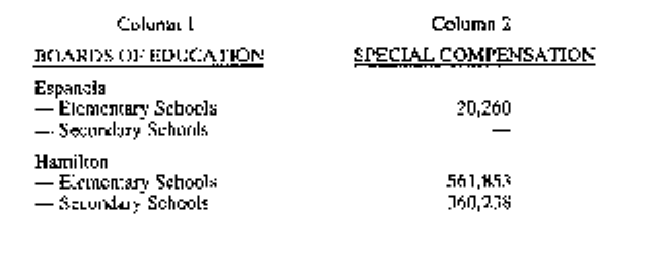
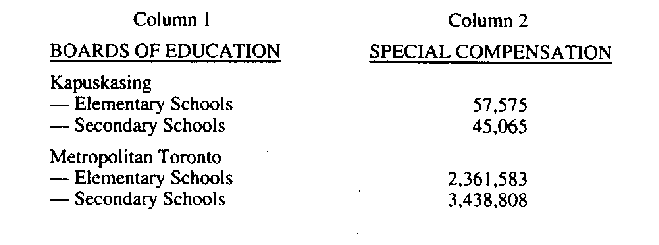
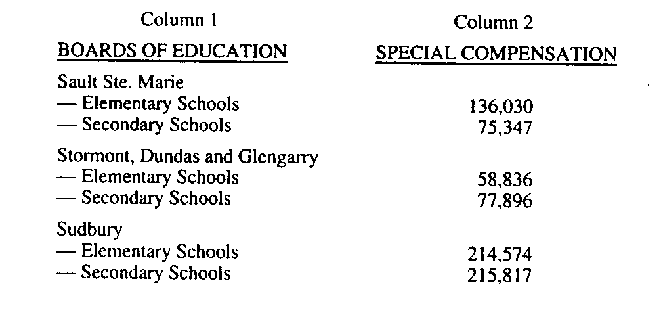
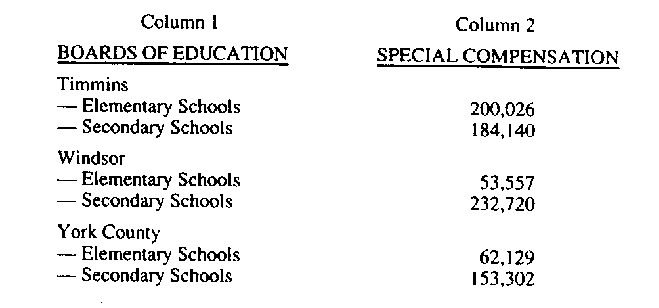
O.Reg. 86/91, Table 1.
TABLE 2
1991 SELECTED GRANTS ($’S PER PUPIL)
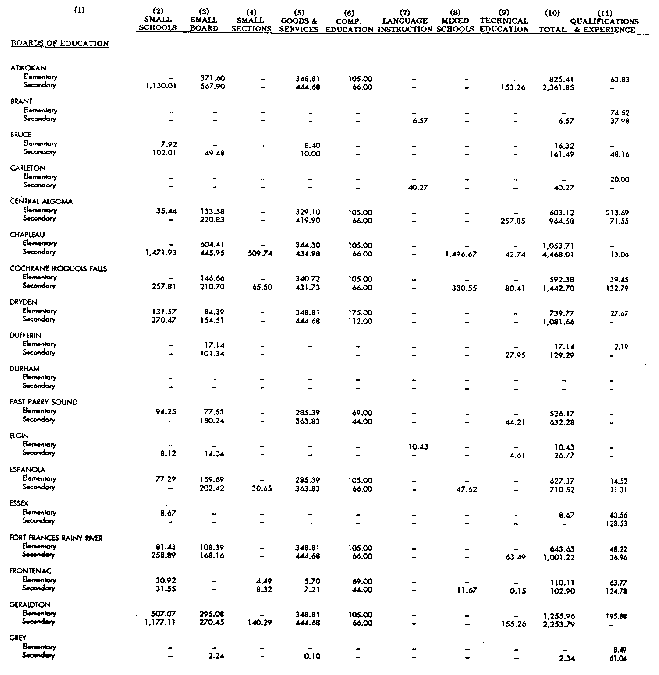
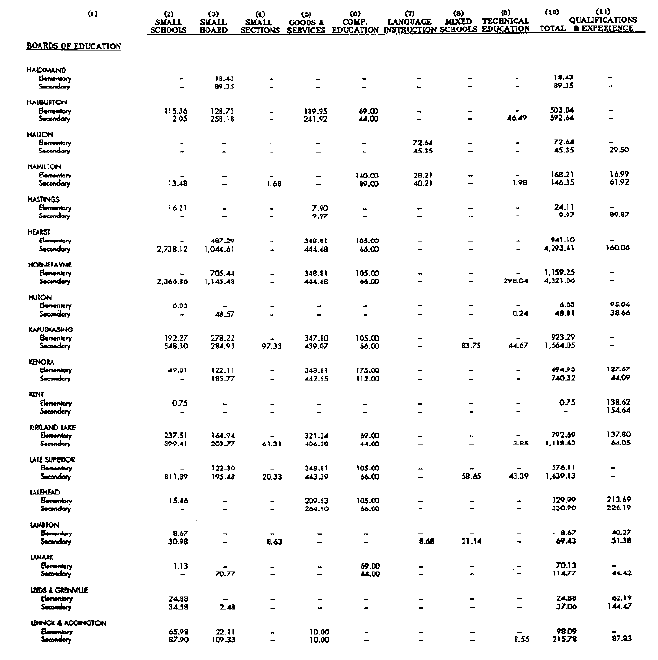
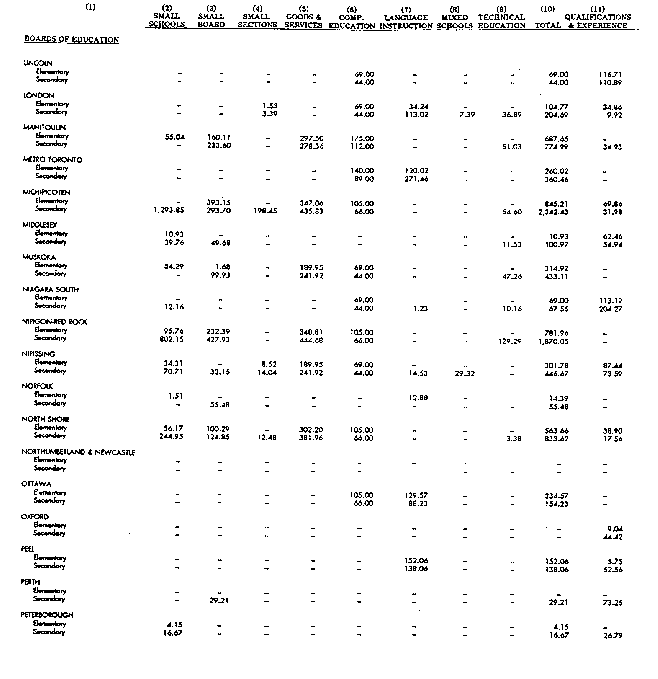
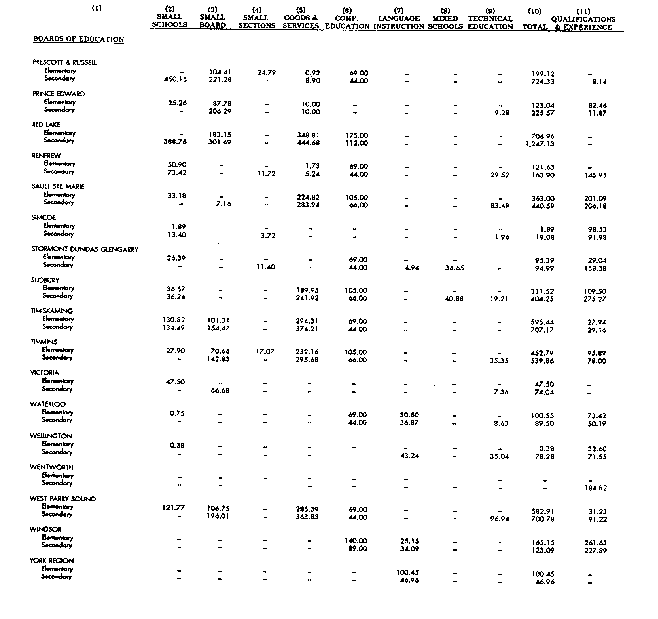
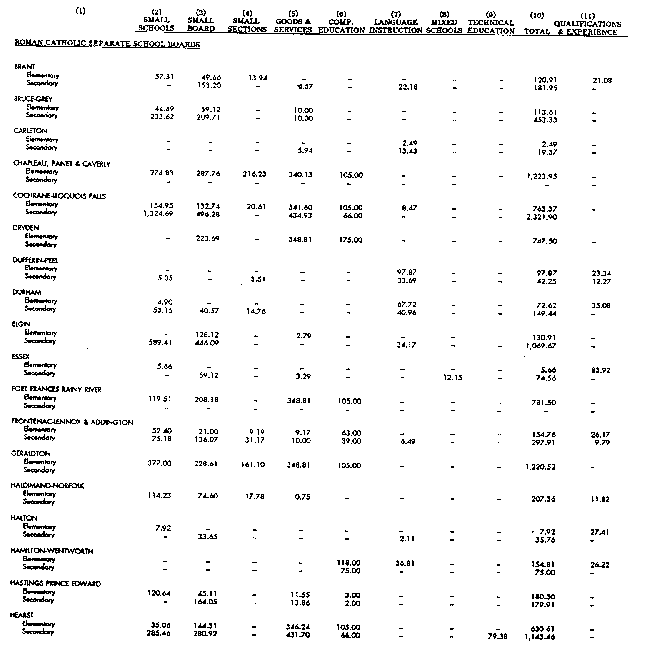
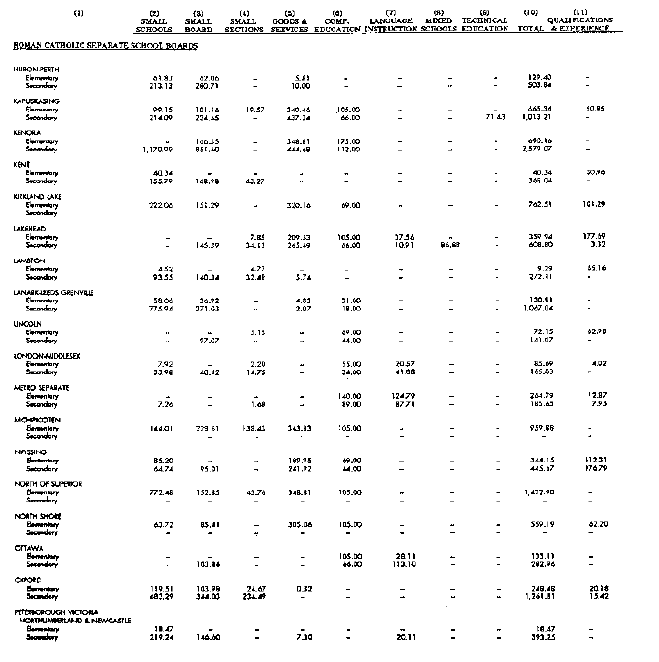
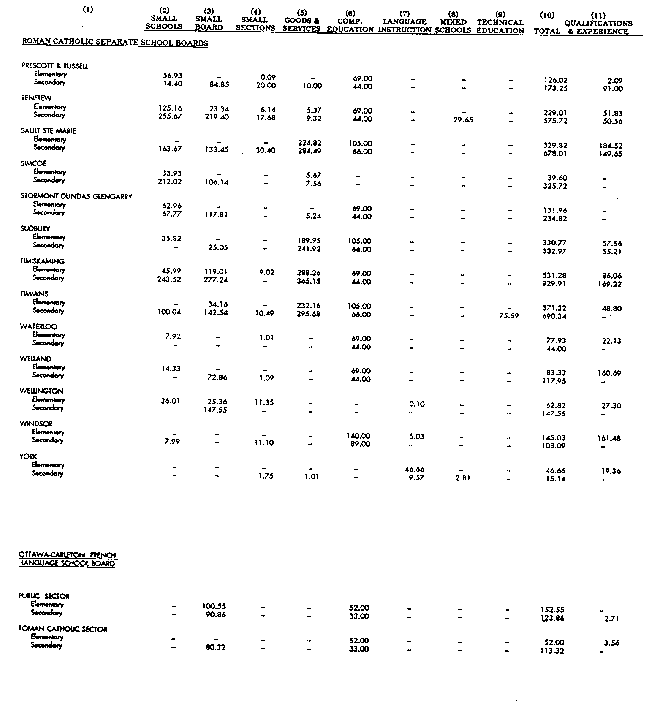
O.Reg. 86/91, Table 2.
TABLE 3
TRANSPORTATION
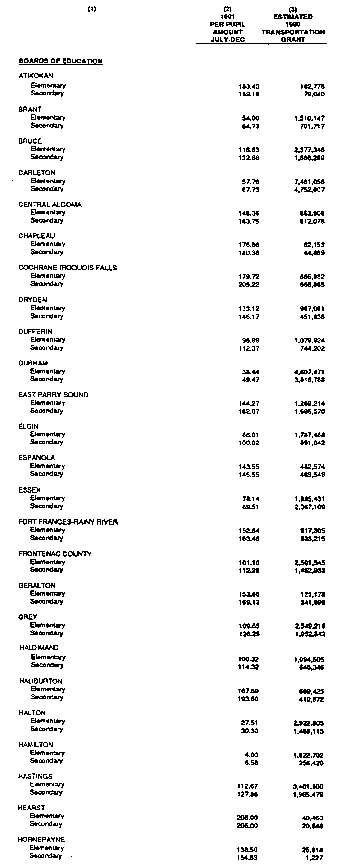
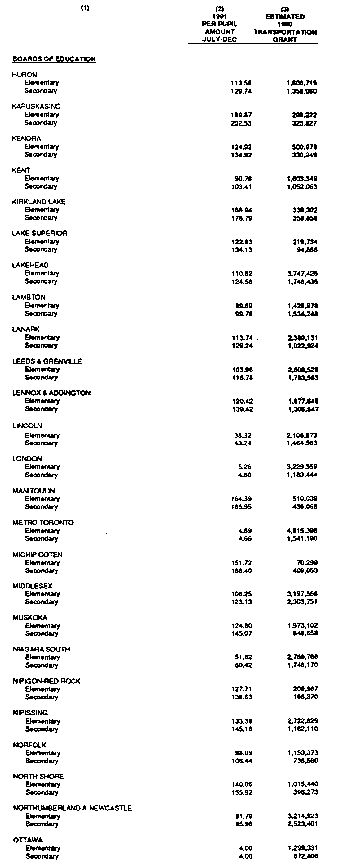
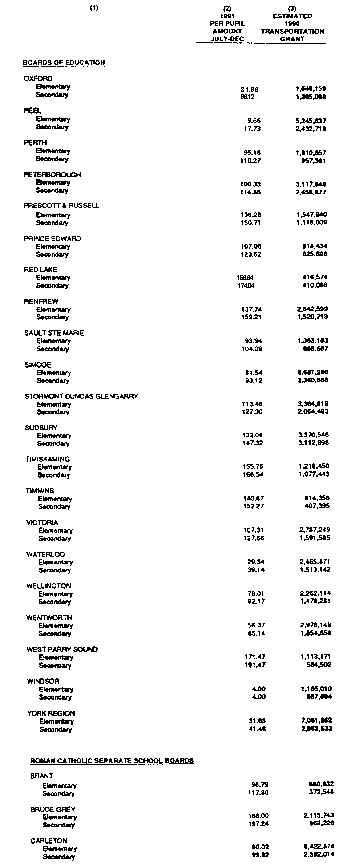
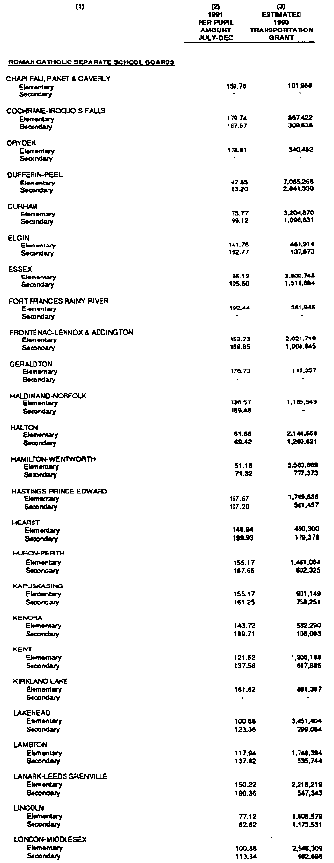
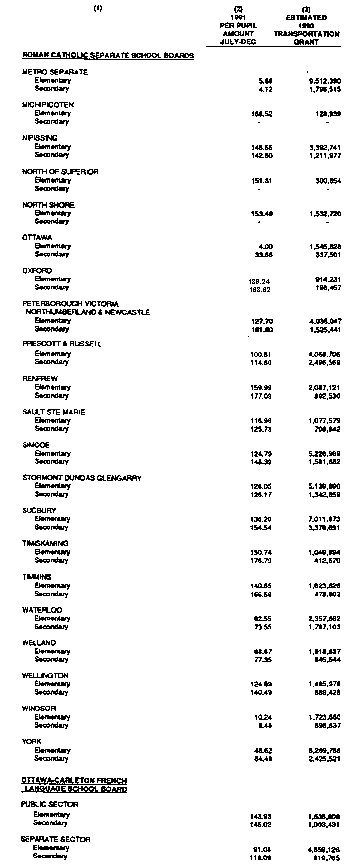
O.Reg. 86/91, Table 3; O. Reg. 121/96, s. 1.
TABLE 4
SPECIAL ASSISTANCE FOR EN BLOC TRANSFER
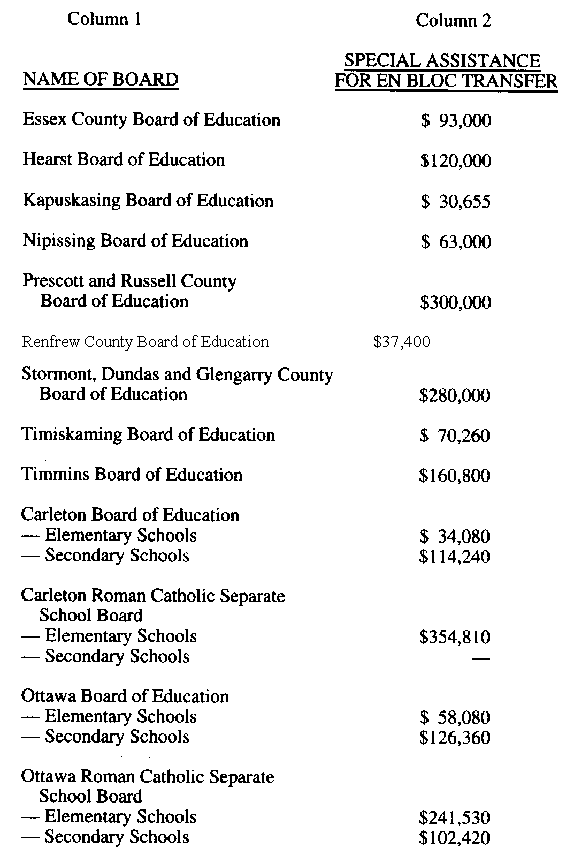
O.Reg. 86/91, Table 4; O. Reg. 294/93, s. 4.